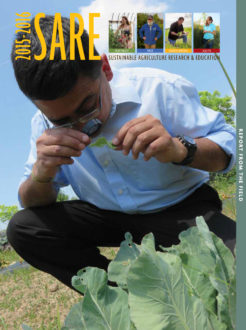SARE is a program of partnerships. This is especially borne out in the projects that SARE funds: Countless projects are widely meaningful to U.S. agriculture because they involve collaborations that draw together researchers, educators, farmers and ranchers, public agencies and nonprofit organizations. 2015/2016 Report from the Field is full of stories of research and education projects that are successful in large part because they have partnerships at their core. For example:
- A multidisciplinary team of researchers at Cornell University created a new kind of assessment to gauge and improve soil health. On-farm testing proved critical to making the assessment as useful to farmers as possible (see p. 7).
- USDA Natural Resources Conservation Service (NRCS) staff now have access to a rich collection of technical information that addresses conservation practices on organic farms, thanks to a partnership between NRCS and Oregon Tilth, the National Center for Appropriate Technology and the Northwest Center for Alternatives to Pesticides (see p. 11).
- Faced with extensive die offs of honeybees they import from other states, beekeepers in Illinois joined together to form the Illinois Queen Initiative, a group that rears and markets bees that are resistant to diseases and are adapted to the local climate (see p. 15).
- Annie's Project—a risk management education program for farm women—has taken off in the South after a multi-state team of Extension educators held events to teach their colleagues how to conduct Annie's Project workshops in their communities (see p. 18).
Read also about the impact of the Sustainable Agriculture Fellowship, a two-year professional development opportunity for Extension educators that has been conducted since 2007 through a partnership between SARE and the National Association of County Agricultural Agents (NACAA). “Our SARE Fellows are generally early or mid-career, and have gone on to serve in leadership roles in NACAA and Extension," says Ohio State University's Mike Hogan, a past president of NACAA. "They are leaders in sustainability for our Extension system and our newer educators.”
